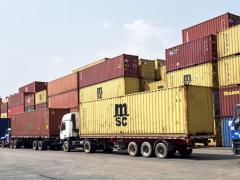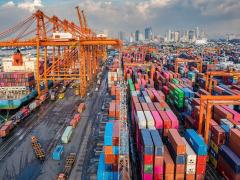Global logistics is finding itself in an artificial intelligence (AI) whirlpool that’s only going to pick up speed as it approaches a supercharged core, sucking under service providers that fail to use the momentum of machine learning to propel themselves into the future.
Addressing a recent event looking at Transport Management Systems (TMS), Mike Mulqueen of JBF Consulting in Guildford, Connecticut, said the changes AI was ushering into the industry were unlike anything he had seen before.
The principal executive of Strategy and Innovation, who has used the better part of this century to assist freight operators navigate tech challenges, said the only development that came close to AI was blockchain.
“That was back in 2015-16, and since then, somewhere in 2022, AI has simply exploded.”
Paraphrasing Andrew Ng, large-language model (LLM) computer scientist who founded Google Brain and is now with Deeplearning AI, Mulqueen said, “AI is the new energy” that will affect TMS in four fundamental ways – ML and predictive analytics, advanced LLM applications through natural language processes, generative AI, and the use of AI as an agent.
Delving into detail, Mulqueen’s insights on topics such as chatbot integration and data dynamics grabbed the attention of his online audience, but the biggest disruptor was left for last – “agentic AI”.
By using AI applications and analytics to replace company functions that often misfired because of human error, service providers could become leaner, meaner and see more return on investment (ROI) by using agentic AI systems in their TMS, he said.
Will vertical applications, in addition to current horizontal AI integrations, lead to job losses?
Undoubtedly.
It was already being seen in the US, Mulqueen pointed out.
Amazon announced earlier this year that it was cutting 14 000 positions, and Microsoft is restructuring its work force by 6 000.
At Amazon, a lot of people in logistics are going to find themselves unemployed, if they’re not retrenched already. However, for the most part, those culled share a middle-management demographic.
This was exactly where service providers could improve through agentic AI, Mulqueen said.
He cited a recent study by the Massachusetts Institute of Technology which found a 95% failure rate in “misaligned focus areas” like invoicing.
Companies willing to implement agentic improvements would see the end-result in ROI, Mulqueen said.
He predicted that agentic integrations would slowly gain ascendancy at company level from the ground up.
“We’ll see it at individual level, at the fleet routing level, at the warehouse management level, at the COF (customer order fulfilment) level, and at the finance level.
“Each one of these different applications is providing a different suite of AI solutions.”
Mulqueen, whose talk was enabled by Opti Systems and Vicenda Supply Chain Insight, said resisting wholesale change at TMS-level was futile.
But he acknowledged that the giddying pace of current technologies, “is causing a lot of chaos in organisations”.













